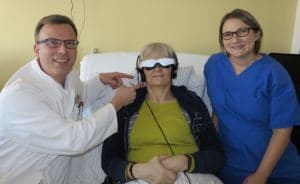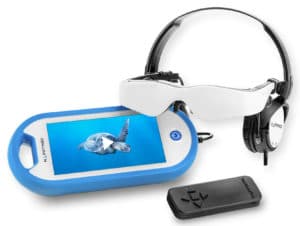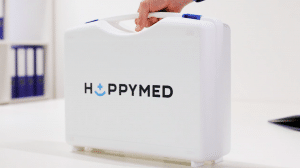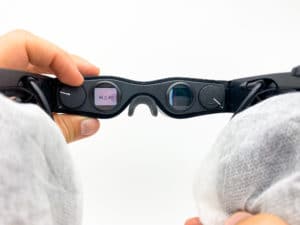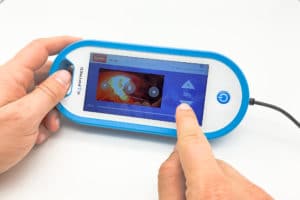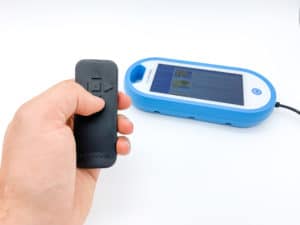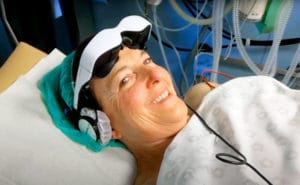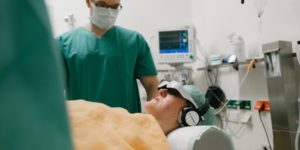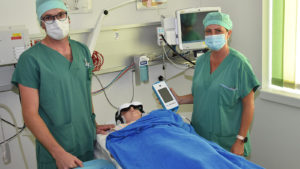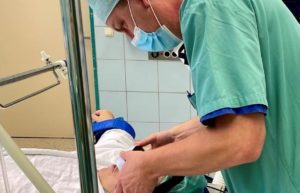Less anxiety and fewer sedatives with PCTA, PTA, TAVI and EPU through audiovisual sedation with video glasses?
Cardiac catheter examinations are a common routine procedure. According to the 2018 Heart Report, around 880,000 cardiac catheter examinations were carried out at over 1000 left heart catheter measuring stations in Germany. One of the challenges for the experts who carry out these examinations is the optimal preparation of the patients.
Although the procedures are not painful, they are found to be very uncomfortable. Many people are very excited and scared because of the procedure so close to the heart. Mild sedation is often indicated. But what do you do if this is not enough? Increasing the dose is not recommended for several reasons, because the patient may need to be able to cooperate to a certain extent, and higher doses of medication also result in a longer recovery time and much more
For this reason, audiovisual sedation with HappyMed video glasses is a welcome and at the same time gentle method of calming and distracting. The HappyMed video glasses make the daily work of cardiologists and nursing staff easier and ensure greater patient satisfaction.
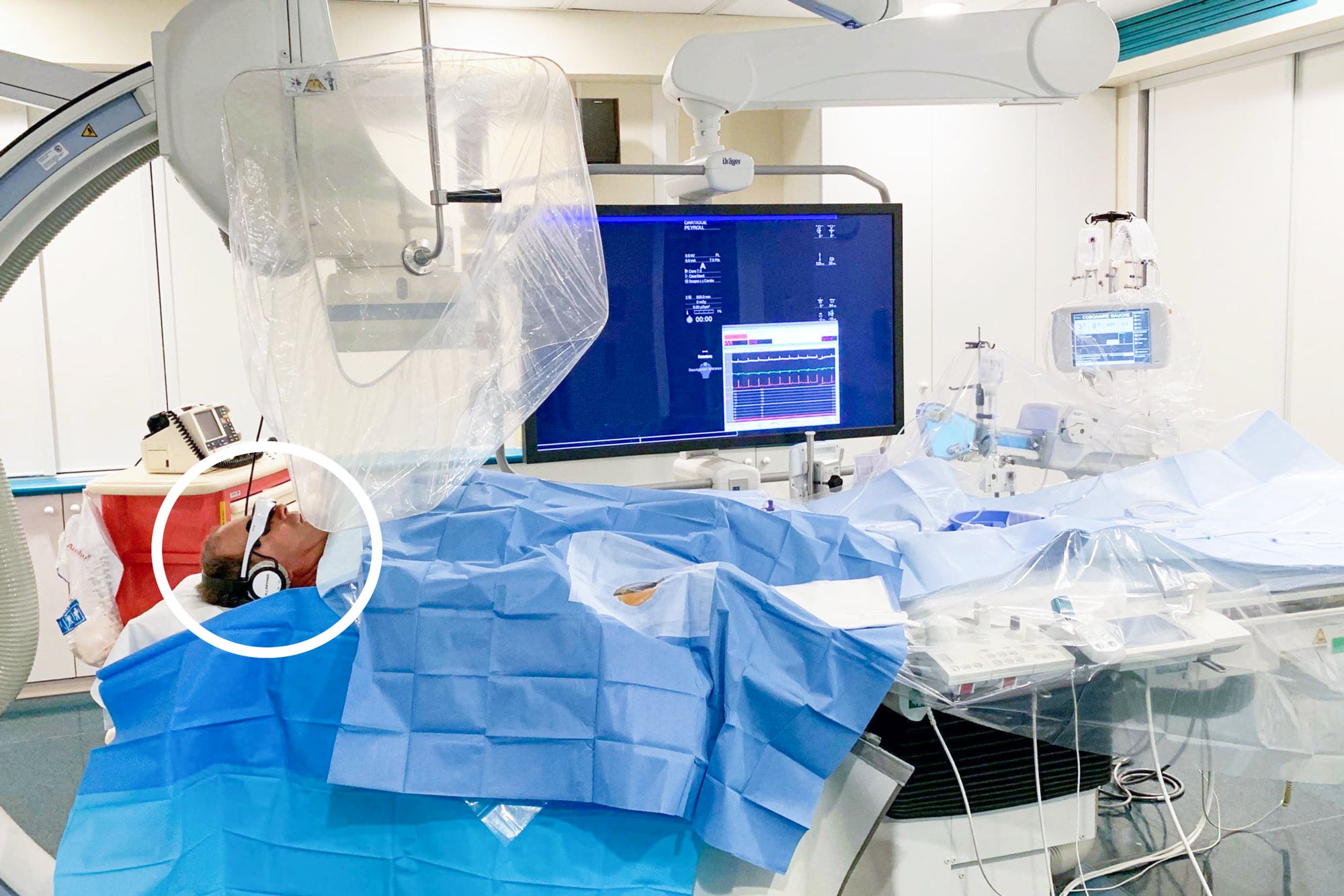
Positive distraction through audiovisual decoupling / sedation
Over 80% of human sensory impressions are perceived through the eyes and ears, which makes audiovisual sedation an extremely effective method for reducing stress and anxiety. HappyMed offers even for patients in very stressful situations, such as a cardiac catheter examination a place of retreat and helps to come up with positive thoughts. The audiovisual sedation helps with that to reduce or eliminate drug sedation altogether.
The HappyMed video glasses are equally suitable for younger and older patients, because there is something for everyone in the extensive range, including children. Despite the audiovisual distraction, doctors and nurses can open at any time Communicate easily with the patient : the headphones can be deactivated with a small lever on the outside and the glasses do not cover the patient’s field of vision 100%. This means that auditory and visual contact is possible at any time.
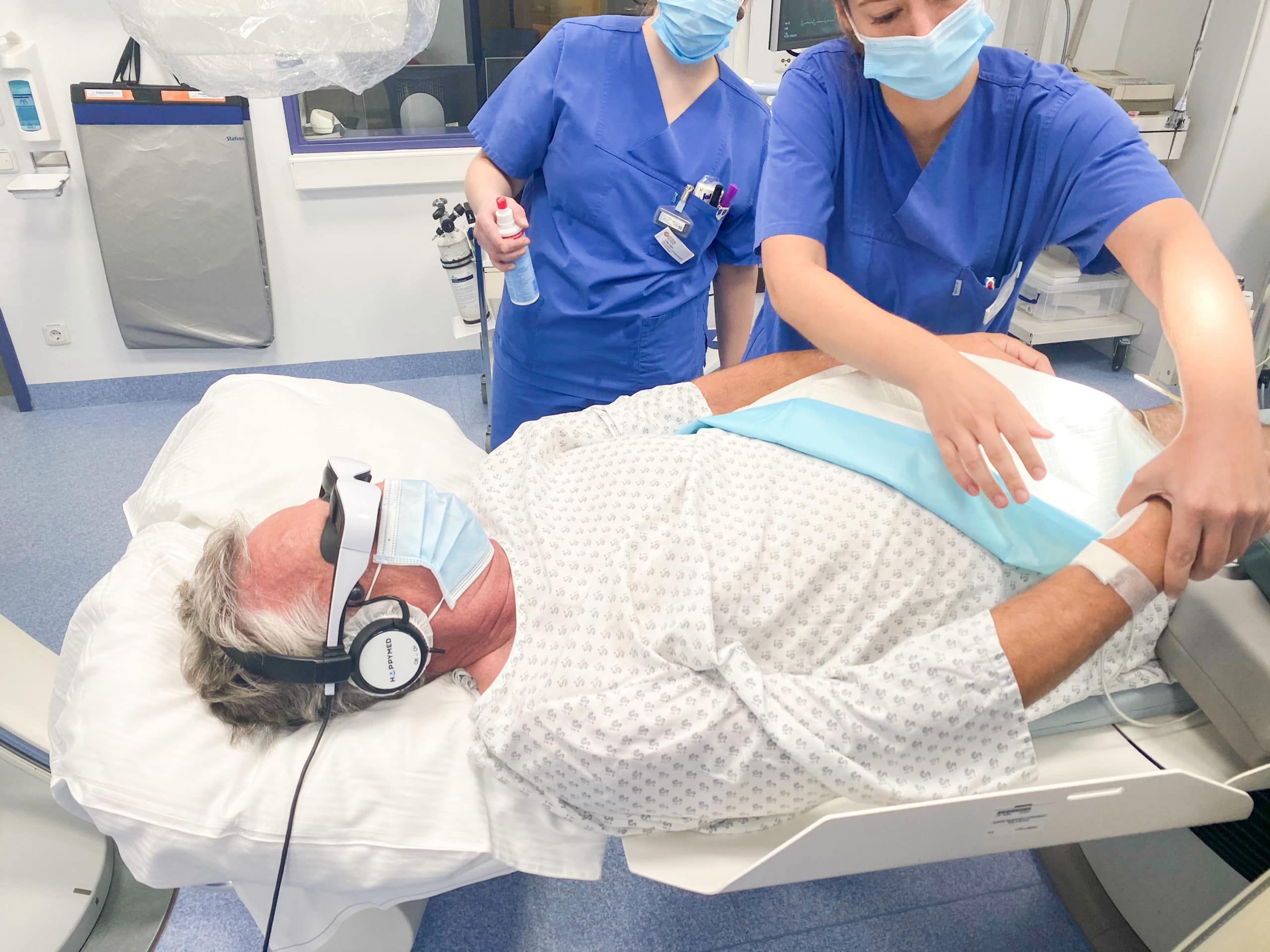
Use in various cardiological interventions
The HappyMed video glasses have been tested in numerous hospital chains in Germany, Austria, France and the Netherlands since the beginning of 2016 and evaluated using questionnaires. In the field of cardiology, the use in the field of cardiac catheter examinations has proven itself.
- Percutaneous Transluminal Coronary Angioplasty (PTCA)
- Percutaneous Transluminal Angioplasty (PTA)
- Transcatheter Aortic Valve Implantation (TAVI)
- Electrophysiological examination of the heart (EPU)
- Cardiac pacemaker and defibrillator implantations
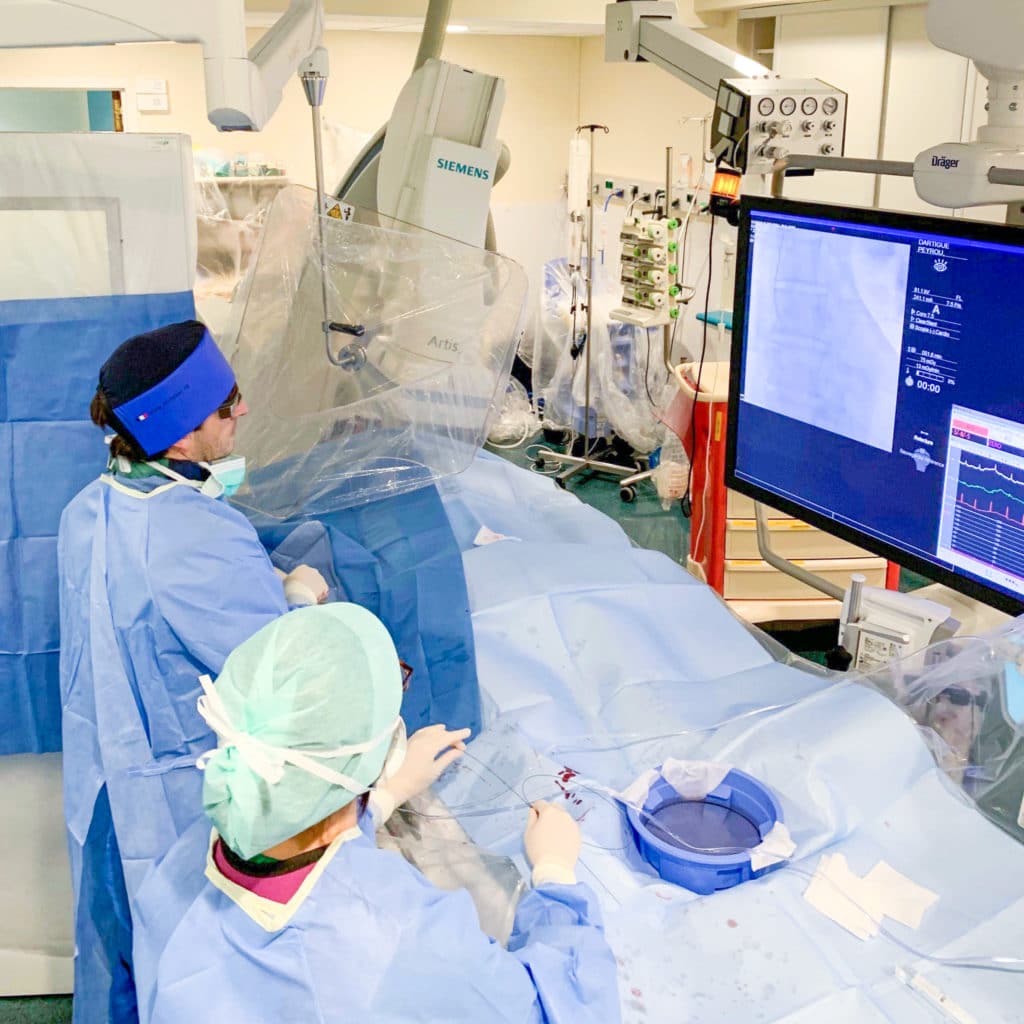
"I am convinced that we can benefit from video glasses especially in the interdisciplinary heart and vascular center (HGZ). In close professional cooperation with my colleagues from various specialist areas, we are constantly working to improve patient comfort and treatment safety. We are therefore very pleased that we can make the treatment and hospital stay in the Sana Kliniken Lübeck much more pleasant for patients by using the video glasses. "
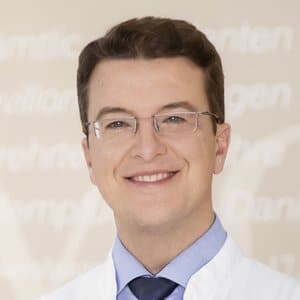
“HappyMed video glasses immerse patients in films, cartoons and concerts. It is a natural way of sedating and calming patients during endovascular procedures. It creates a very relaxing environment for the entire surgical team and helps to achieve the best possible outcome for the patient. "

Results from studies and ongoing projects
A study on the use of HappyMed in patients with transfemoral aortic valve replacement (TAVI) (n = 27) was successfully carried out at the German Heart Center Berlin in 2018.
- The results showed that 69% of the patients felt well distracted by the video glasses.
- For 59% of the patients, the treatment with the video glasses became more tolerable.
- The administration of analgesics could be reduced in 27% of the patients.
- The sedatives could be partially or completely eliminated in 23% of the patients.
The results of this study prompted the team to conduct another study to look more closely at the effects of HappyMed. The results of the follow-up study can be expected by the end of 2021. The topic “Pain reduction through audiovisual distraction in the context of transcatheter aortic valve implantations (TAVI)” is again the focus of the survey. The measurement of the subjectively perceived pain, the subjectively perceived duration of the intervention, the patient comfort during the intervention are evaluated. In addition, the hypothesis becomes a Reducing the remifentanil dosage checked.
“We were looking for ways to acoustically shield our patients from their surroundings in the operating room. Conversations between medical staff during surgery can create anxiety and uncertainty in patients. With HappyMed we go one step further and offer our patients both auditory and visual distraction. "
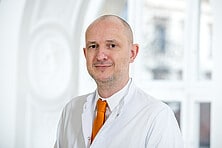
At the Helios Heart Center Leipzig , a study is running to record pain intensity and patient satisfaction with pacemaker / ICD operations using video glasses for audiovisual distraction. As part of the randomized controlled study, 200 patients will be examined with regard to the pain-reducing effect of HappyMed video glasses during cardiac pacemaker or defibrillator implantations. Further questions concern the systematic consumption of analgesics and sedatives, as well as patient satisfaction with the new distraction method. (Source: The Leipzig Heart Institute and the Leipzig Heart Center research pioneering methods in patient care )
A first research report was published in Leipzig Heart Magazine on April 3, 2019.
"Patient care is important to us, we want to ignore stress factors as far as possible. More medication isn't always the safest option, so we're looking for alternatives. The HappyMed video glasses have proven to be an excellent tool for use in cardiac catheter and EPU laboratories. "

In the Unfallklinikum Berlin, the use of HappyMed video glasses was examined in 50 patients who used the video glasses during operations in the outpatient and central operating theater and who received them preoperatively before cardiac catheter examinations.
-
It could be shown that 60% of the patients feel more relaxed and less anxious after putting on the HappyMed video glasses.
-
The amount of sedation administered was reduced in 46% of patients.
-
In 10% of the cases, sedation could be dispensed with entirely thanks to audiovisual distraction.
In addition to higher patient satisfaction, there was also added value for the medical staff: according to the survey, 96% of the doctors recommended the HappyMed video glasses to others; In 94% of the cases, doctors enjoyed working with HappyMed. From a medical point of view, the treatment situation has also relaxed through the use of HappyMed video glasses (Ø 8.5 on a scale of 1-10; 10 = “I completely agree”).
The HappyMed system with video glasses, touchscreen and ergonomically adapted surround headphones makes it possible: Patients are positively distracted and reassured because they can immerse themselves in the world of feature films, nature films or interesting documentaries. Scary sensations then take a back seat. This reduces the perception of stress, fear and pain and the patients subjectively perceive the treatment for a shorter and more pleasant period.
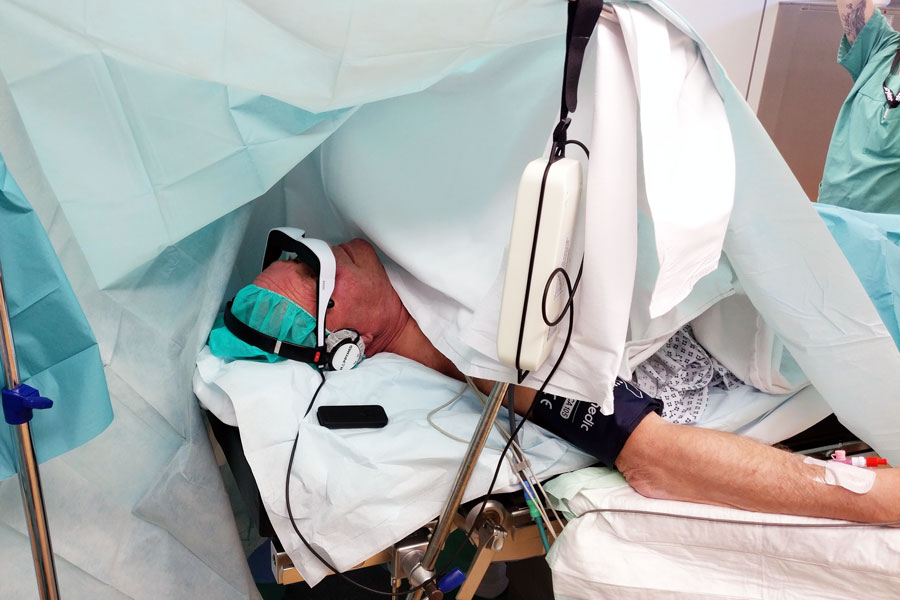
Use it safely
HappyMed is a certified class I medical device. This enables trouble-free use in all treatment rooms with other devices.
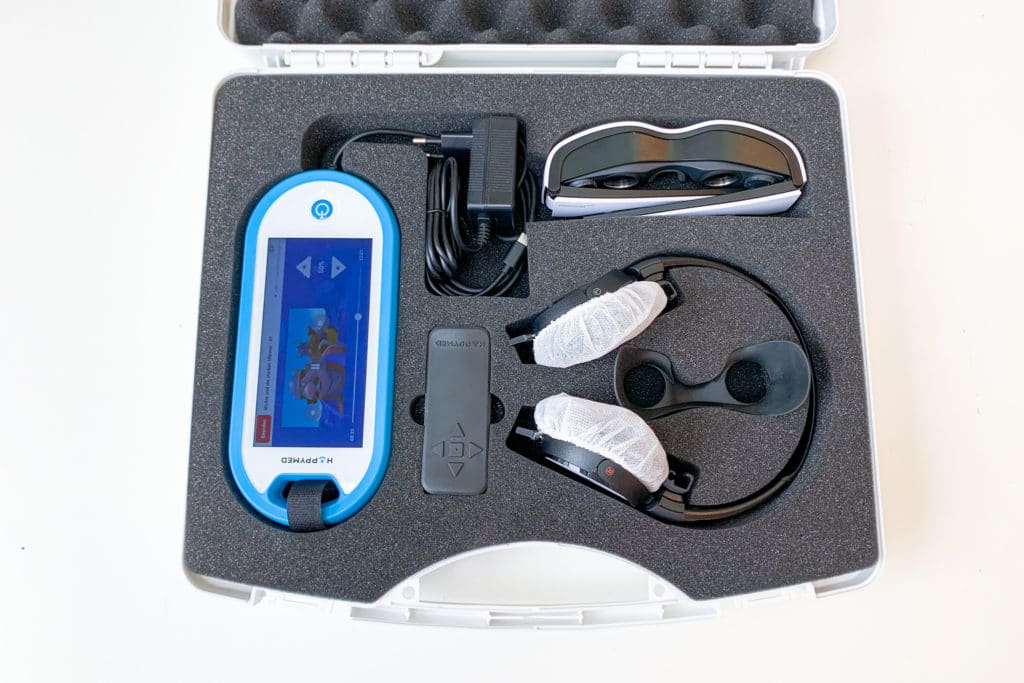
Compact & Mobile System
The HappyMed system is delivered to you in a case with video glasses , ergonomically-adapted surround sound headphones and a media center. The HappyMed system is quickly ready for use.. There is no configuration or installation required.
You can easily transport the compact and mobile system between different treatment rooms or from one department to the next.
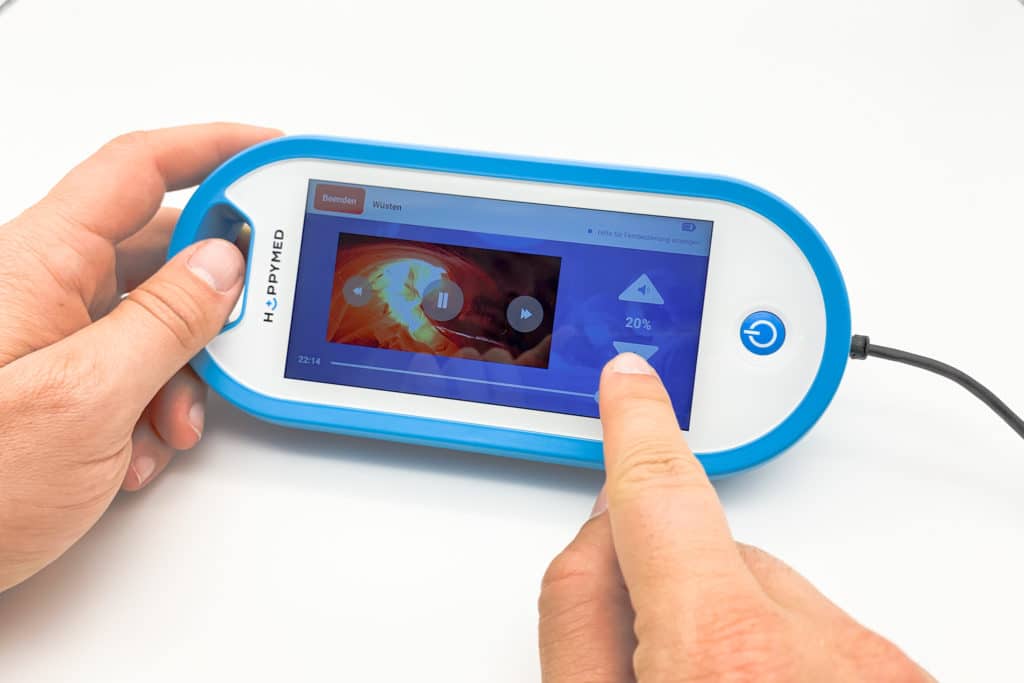
Film Program Has Something for Everyone
HappyMed is already filled with suitable films for all of your patients. The film program offers entertainment or relaxation for all ages – even for children. Patients can choose among feature films, comedies, documentaries, nature relaxation, classical concerts, and children’s series.
Films are stored locally on the device’s media library so HappyMed can be used without an Internet or WLAN connection.
In addition, all films are licensed for commercial use in clinics – an important legal requirement for implementation in the medical field.
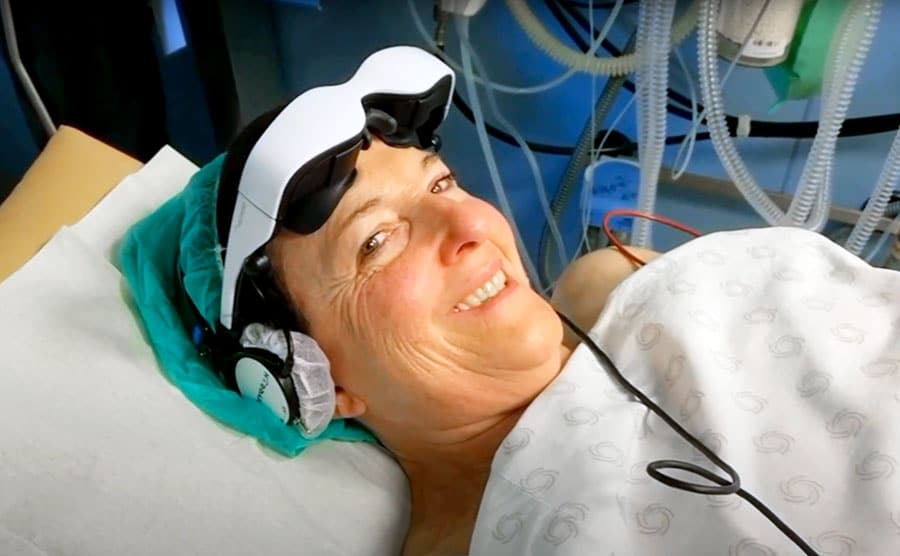
Your Patients Will Thank You
92% of patients would like to use HappyMed again and 90% would recommend the video glasses to others. After putting on the HappyMed video glasses, the patients feel significantly less nervous and less anxious, and more calm and relaxed .
Medical staff enjoy working with HappyMed in more than 80% of the cases.
In 45% of interventions, the HappyMed video glasses can reduce use of sedatives, painkillers or anesthetics. In 73% of cases, medication could even be completely left out.
(Source: Survey in several clinics in a German chain of clinics (n = 110), data on file.)
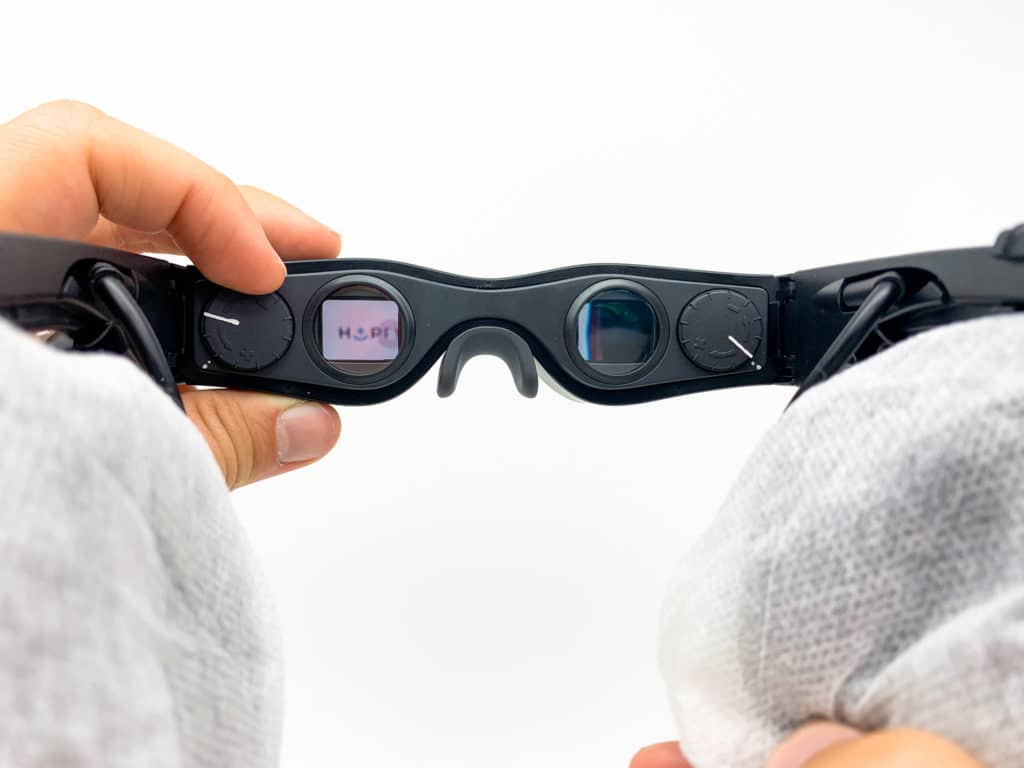
Suitable for People Who Wear Glasses
Image sharpness can be set for each eye using adjustment wheels. So people with glasses can enjoy a great viewing experience as well!
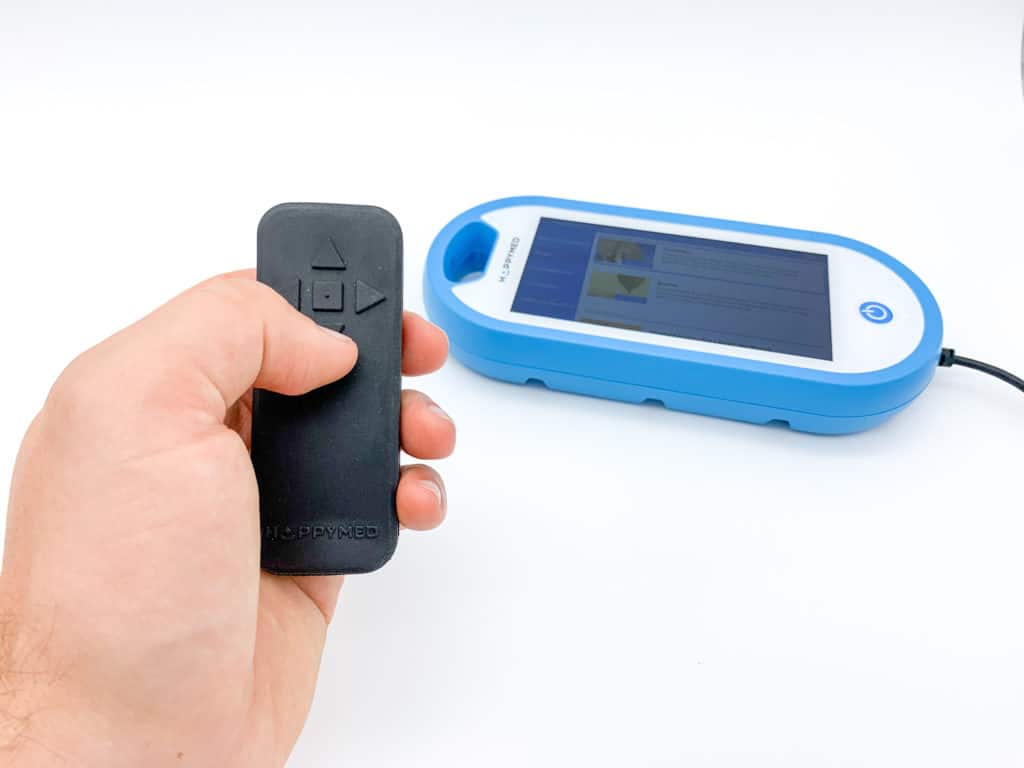
Intuitive Control
The HappyMed system can be easily operated by the staff or patient with a touchscreen or remote control.

Speak to Patients at Any Time
Activate or deactivate the headphones individually to stay in good contact with the patient at all times.
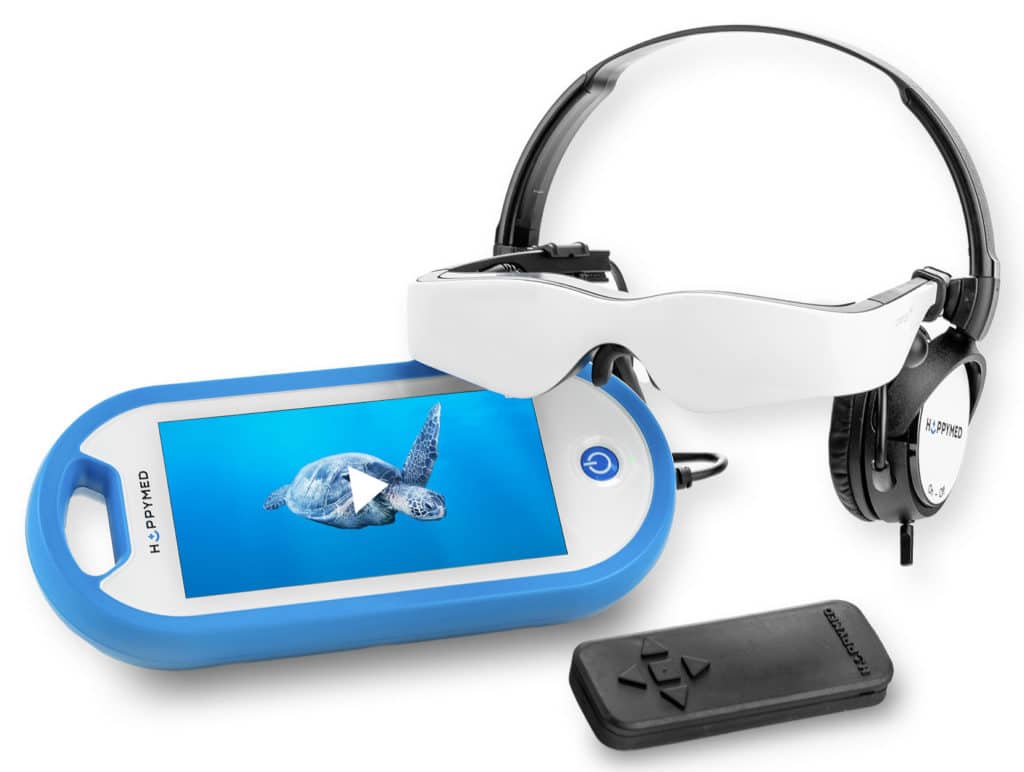
Rental Model for Device and Film Licenses
The video glasses are exclusively rented. The monthly subscription cost is just €199. That includes the complete system and the film licenses.
Device purchase is unfortunately not possible. That is due to the ongoing licensing fees for the commercial use of the films and the management of the related contracts.
The economic benefit for the clinic comes from the use of more regional anesthesia instead of general anesthesia, resulting in lower medication costs, relief for the nursing staff and shorter stay in the recovery room and the clinic.
Try HappyMed for 14 days for free!
Over 150,000 applications since 2015
HappyMed has been used in over 127 clinics in Germany, Great Britain, France, the Netherlands and Switzerland since 2015. It has now been used over 150,000 times .

Further information on our references:
- HappyMed at Asklepios: digital sedative for interventions
- HappyMed at Sana: cinema experience instead of general anesthesia
- HappyMed at Helios: Relaxed in the operating room
- HappyMed at Erler Kliniken: Positive distraction in the operating room through video glasses
- HappyMed in the Franzikushospital: anesthesia with cinema glasses
- HappyMed at Agaplesion: the film is over, the operation is in progress
- HappyMed at Becker Klinik: Hip and knee joint operations with gentle anesthesia
- HappyMed at the Vivantes Breast Center: Audiovisual glasses distract from operations
Numerous chief physicians recommend the application
Nine out of ten patients later tell us that they would use them again.
"Many find the glasses very pleasant. They tell us that the glasses can distract them very well. It is probably the case that the brain is very busy with visual and acoustic stimuli - although you can also hear the" trappings " Patients are also approachable, but they are calmer. And nine out of ten tell us later that they would use them again. "

Makes work easier for both doctors and anesthesiologists.
The HappyMed video glasses distract the patient from unpleasant sensations, stimulate the brain with positive impressions and relaxation occurs. Scary sensory impressions are faded out and the patients concentrate so much on the video content that pinpricks or even unpleasant touches can be below the negative limit of perception. This fact makes work easier for both doctors and anesthetists. "
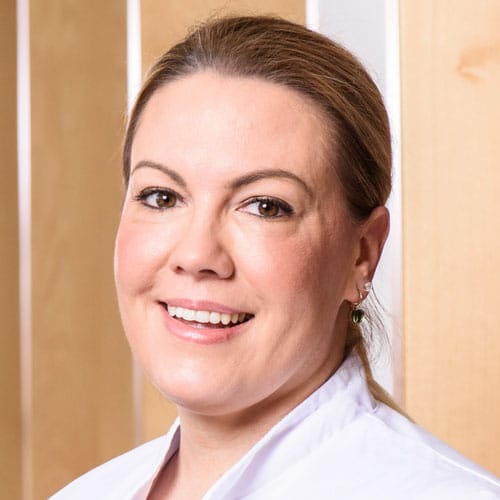
Great new opportunity!
"The problem with patients is often that they are afraid of this partial anesthetic because they do not want to hear anything about the operation, because they are afraid that the anesthesia will not work properly and say:" I want general anesthesia. " do not know about the risks of general anesthesia. This means that this method of audiovisual care for the patient during partial anesthesia is a great new opportunity. "

We were amazed at the immediate positive effects, as well as at the acceptance in the clinics, by employees and patients.
"For us, the patient's well-being comes first - and for this we also like to use innovative and convincing technologies". We were amazed at the immediate positive effects, as well as at the acceptance in the clinics, by employees and patients. Patients breathe more slowly with glasses, their heart beats more calmly, the individual pain sensation decreases and so fewer medicinal sedatives are needed. Overall, the acceptance rate of gentle regional anesthesia instead of general anesthesia is increasing. Doctor and hospital phobias can also be positively influenced in this way. Ultimately, the use of video glasses leads to higher patient satisfaction, as the manufacturer has established. "

Children are less stressful and hardly need any medication to calm them down.
"I am enthusiastic about the positive effect on our little patients. The children who watch a film on the way to the operating theater are much less stressful and hardly need any medication to calm them down. "

With this product, patients can experience their treatment in a more relaxed, distracted and stress-free manner.
For many patients, the thought of medical treatment is enough to trigger anxiety and stress. The loss of control means that they focus even more on their surroundings and react over-sensitively to a wide variety of sensory impressions, such as the beeping of the machines. There is an increased release of cortisol, which increases blood pressure and accelerates pulse and breathing. With this product, patients can experience their treatment in a more relaxed, distracted and stress-free manner. "
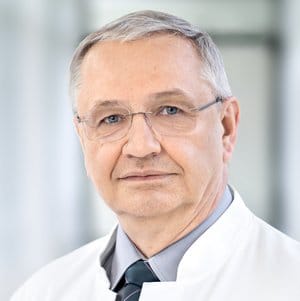
In summary: The facts about HappyMed – a certified medical product
- Certified medical product class I in the 3rd product generation : trouble-free use in the operating room with other devices possible.
- In use since 2015 . Already used over 150,000 times in 127 clinics . Among other things in numerous Helios, Asklepios, Sana clinics and in the Charité University Medicine Berlin .
- The new way of positive distraction and reassurance for patients during medical interventions and operations - although addressing them is still possible throughout.
- Correlation between positive audiovisual sedation and lower feelings of stress, fear and pain proven by numerous studies and evaluations in leading clinics.
- Stunning Cinema Experience: Large selection of feature and nature films as well as documentaries. There is something for everyone - even for children!
- Immediate Usability: Compact & mobile system, meaning no installation work!
- Intuitive Use: Nursing staff and patients can control the device with the touch screen or remote control.
- Easy Cleaning: The system can be completely disinfected, earpads quickly exchanged, and a cleaning plan is available.
- Battery life up to 10 hours : suitable for many short but also for several longer interventions
- Rental model for device and film licenses: monthly costs of 199 euros for glasses
- Business benefits through more regional anesthesia instead of general anesthesia, lower medication costs, relief for the nursing staff and shorter time spent in the recovery room.
- Free, non-binding test possible for 14 days!
Try HappyMed for 14 days for free!
RTL report on the use in a knee operation

Latest studies, experience reports and evaluations
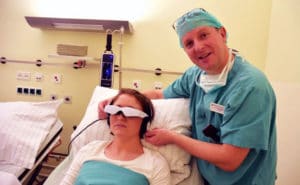
Video glasses instead of sedative pills: HappyMed in use in Helios clinics and the Leipzig Heart Center
Continue reading "